Research Template: Home-Based Dementia Care for Improved Outcomes
VerifiedAdded on 2022/09/09
|7
|2135
|17
Homework Assignment
AI Summary
This research template explores the effectiveness of home-based care for dementia patients. It begins by formulating a qualitative PICO question regarding the impact of home care on treatment outcomes. The assignment details a literature search using databases like Google Scholar, CINAHL, and MEDLINE, employing specific filters to refine results. Five articles are analyzed, including their study aims, methods, results, and limitations, along with their relevance to the research question. The template also examines how to integrate the new evidence-based practice within a person-centered care framework, considering prerequisites, the care environment, and the care process. Furthermore, it discusses the role of transformational leadership in embedding the research into practice, focusing on principles like idealizing influence, inspirational motivation, intellectual stimulation, and individualized consideration. The research also focuses on the use of smartwatches to monitor patients and the recruitment of social care workers to enhance social adherence.
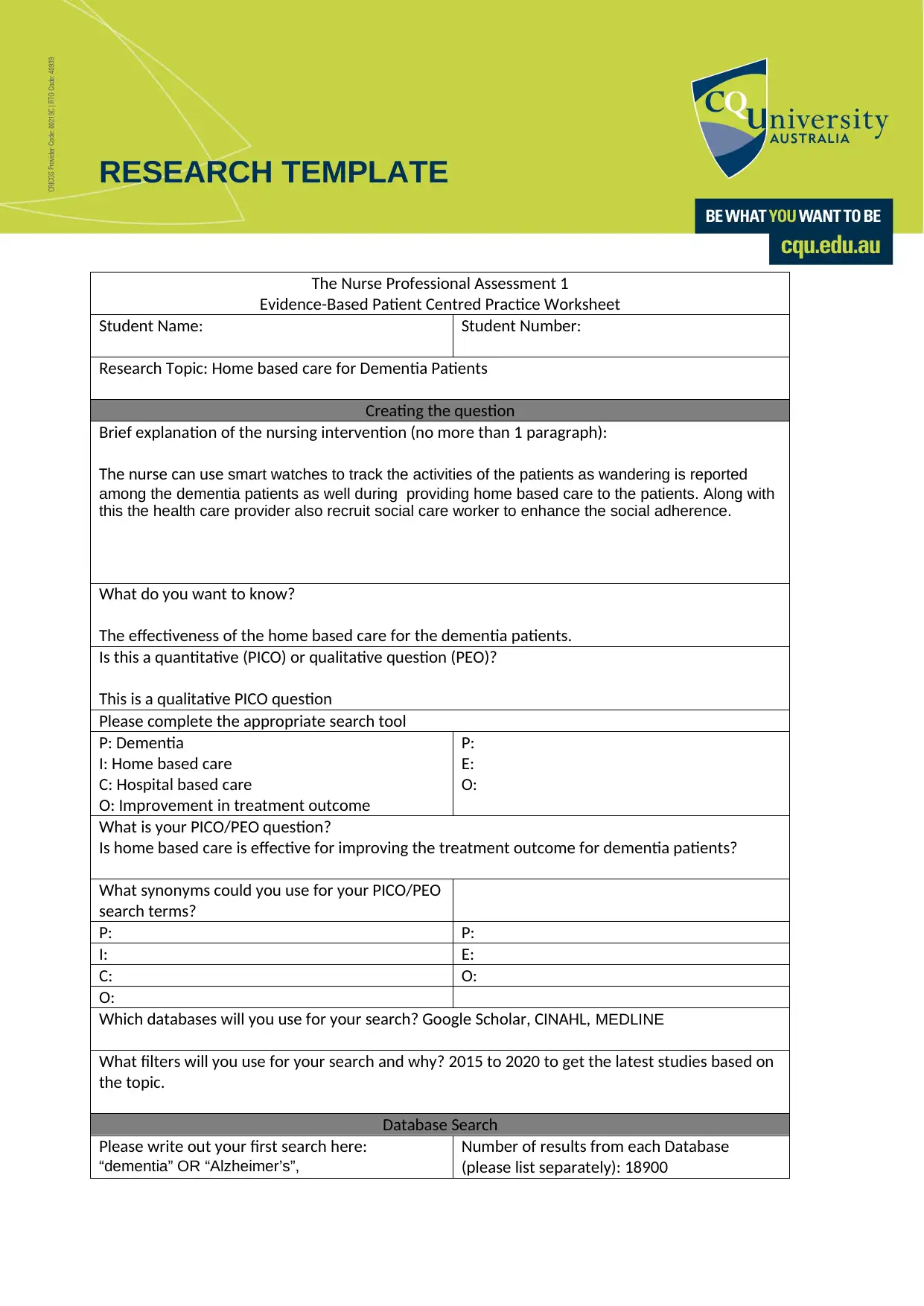
RESEARCH TEMPLATE
The Nurse Professional Assessment 1
Evidence-Based Patient Centred Practice Worksheet
Student Name: Student Number:
Research Topic: Home based care for Dementia Patients
Creating the question
Brief explanation of the nursing intervention (no more than 1 paragraph):
The nurse can use smart watches to track the activities of the patients as wandering is reported
among the dementia patients as well during providing home based care to the patients. Along with
this the health care provider also recruit social care worker to enhance the social adherence.
What do you want to know?
The effectiveness of the home based care for the dementia patients.
Is this a quantitative (PICO) or qualitative question (PEO)?
This is a qualitative PICO question
Please complete the appropriate search tool
P: Dementia
I: Home based care
C: Hospital based care
O: Improvement in treatment outcome
P:
E:
O:
What is your PICO/PEO question?
Is home based care is effective for improving the treatment outcome for dementia patients?
What synonyms could you use for your PICO/PEO
search terms?
P: P:
I: E:
C: O:
O:
Which databases will you use for your search? Google Scholar, CINAHL, MEDLINE
What filters will you use for your search and why? 2015 to 2020 to get the latest studies based on
the topic.
Database Search
Please write out your first search here:
“dementia” OR “Alzheimer’s”,
Number of results from each Database
(please list separately): 18900
The Nurse Professional Assessment 1
Evidence-Based Patient Centred Practice Worksheet
Student Name: Student Number:
Research Topic: Home based care for Dementia Patients
Creating the question
Brief explanation of the nursing intervention (no more than 1 paragraph):
The nurse can use smart watches to track the activities of the patients as wandering is reported
among the dementia patients as well during providing home based care to the patients. Along with
this the health care provider also recruit social care worker to enhance the social adherence.
What do you want to know?
The effectiveness of the home based care for the dementia patients.
Is this a quantitative (PICO) or qualitative question (PEO)?
This is a qualitative PICO question
Please complete the appropriate search tool
P: Dementia
I: Home based care
C: Hospital based care
O: Improvement in treatment outcome
P:
E:
O:
What is your PICO/PEO question?
Is home based care is effective for improving the treatment outcome for dementia patients?
What synonyms could you use for your PICO/PEO
search terms?
P: P:
I: E:
C: O:
O:
Which databases will you use for your search? Google Scholar, CINAHL, MEDLINE
What filters will you use for your search and why? 2015 to 2020 to get the latest studies based on
the topic.
Database Search
Please write out your first search here:
“dementia” OR “Alzheimer’s”,
Number of results from each Database
(please list separately): 18900
Paraphrase This Document
Need a fresh take? Get an instant paraphrase of this document with our AI Paraphraser
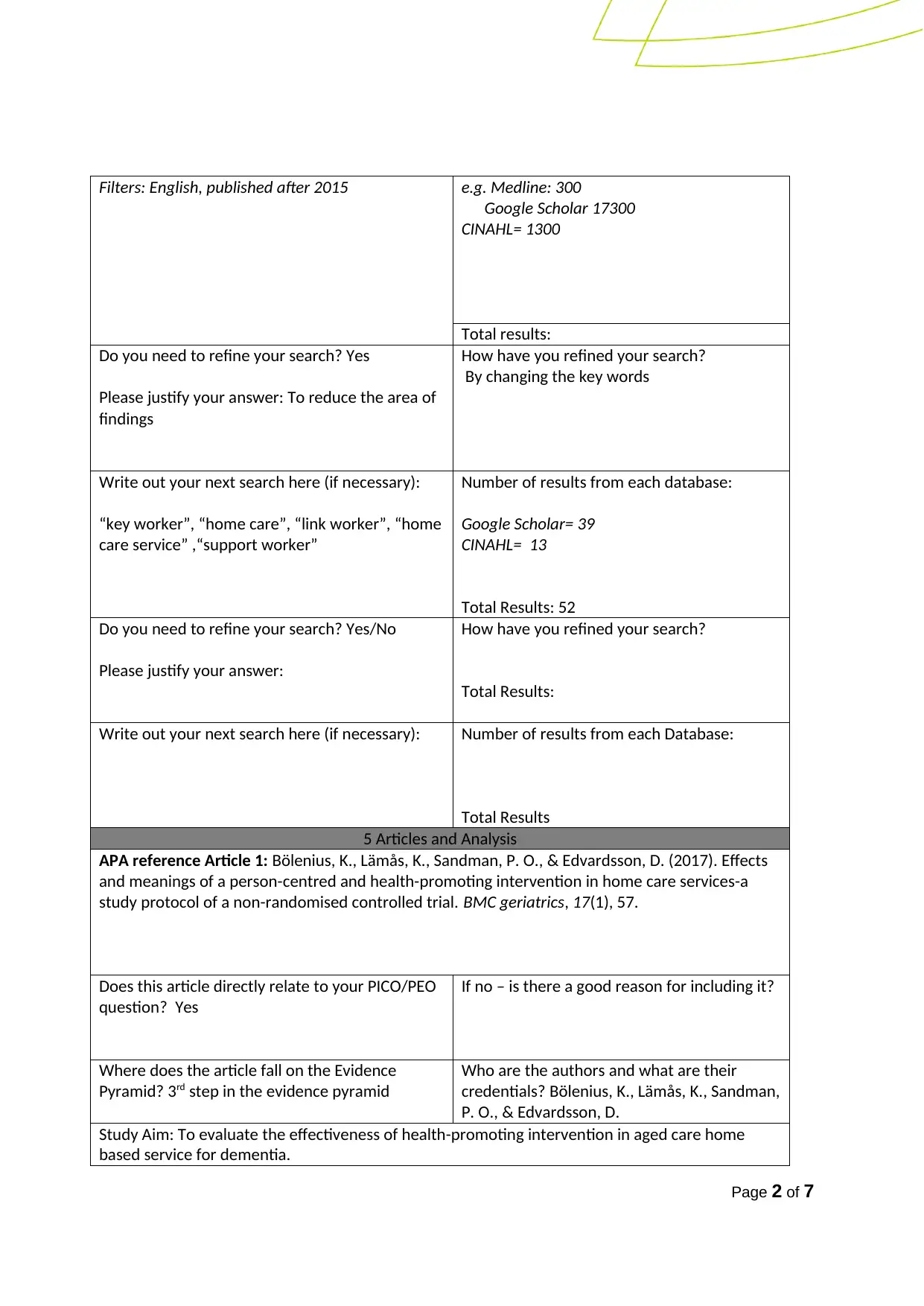
Filters: English, published after 2015 e.g. Medline: 300
Google Scholar 17300
CINAHL= 1300
Total results:
Do you need to refine your search? Yes
Please justify your answer: To reduce the area of
findings
How have you refined your search?
By changing the key words
Write out your next search here (if necessary):
“key worker”, “home care”, “link worker”, “home
care service” ,“support worker”
Number of results from each database:
Google Scholar= 39
CINAHL= 13
Total Results: 52
Do you need to refine your search? Yes/No
Please justify your answer:
How have you refined your search?
Total Results:
Write out your next search here (if necessary): Number of results from each Database:
Total Results
5 Articles and Analysis
APA reference Article 1: Bölenius, K., Lämås, K., Sandman, P. O., & Edvardsson, D. (2017). Effects
and meanings of a person-centred and health-promoting intervention in home care services-a
study protocol of a non-randomised controlled trial. BMC geriatrics, 17(1), 57.
Does this article directly relate to your PICO/PEO
question? Yes
If no – is there a good reason for including it?
Where does the article fall on the Evidence
Pyramid? 3rd step in the evidence pyramid
Who are the authors and what are their
credentials? Bölenius, K., Lämås, K., Sandman,
P. O., & Edvardsson, D.
Study Aim: To evaluate the effectiveness of health-promoting intervention in aged care home
based service for dementia.
Page 2 of 7
Google Scholar 17300
CINAHL= 1300
Total results:
Do you need to refine your search? Yes
Please justify your answer: To reduce the area of
findings
How have you refined your search?
By changing the key words
Write out your next search here (if necessary):
“key worker”, “home care”, “link worker”, “home
care service” ,“support worker”
Number of results from each database:
Google Scholar= 39
CINAHL= 13
Total Results: 52
Do you need to refine your search? Yes/No
Please justify your answer:
How have you refined your search?
Total Results:
Write out your next search here (if necessary): Number of results from each Database:
Total Results
5 Articles and Analysis
APA reference Article 1: Bölenius, K., Lämås, K., Sandman, P. O., & Edvardsson, D. (2017). Effects
and meanings of a person-centred and health-promoting intervention in home care services-a
study protocol of a non-randomised controlled trial. BMC geriatrics, 17(1), 57.
Does this article directly relate to your PICO/PEO
question? Yes
If no – is there a good reason for including it?
Where does the article fall on the Evidence
Pyramid? 3rd step in the evidence pyramid
Who are the authors and what are their
credentials? Bölenius, K., Lämås, K., Sandman,
P. O., & Edvardsson, D.
Study Aim: To evaluate the effectiveness of health-promoting intervention in aged care home
based service for dementia.
Page 2 of 7
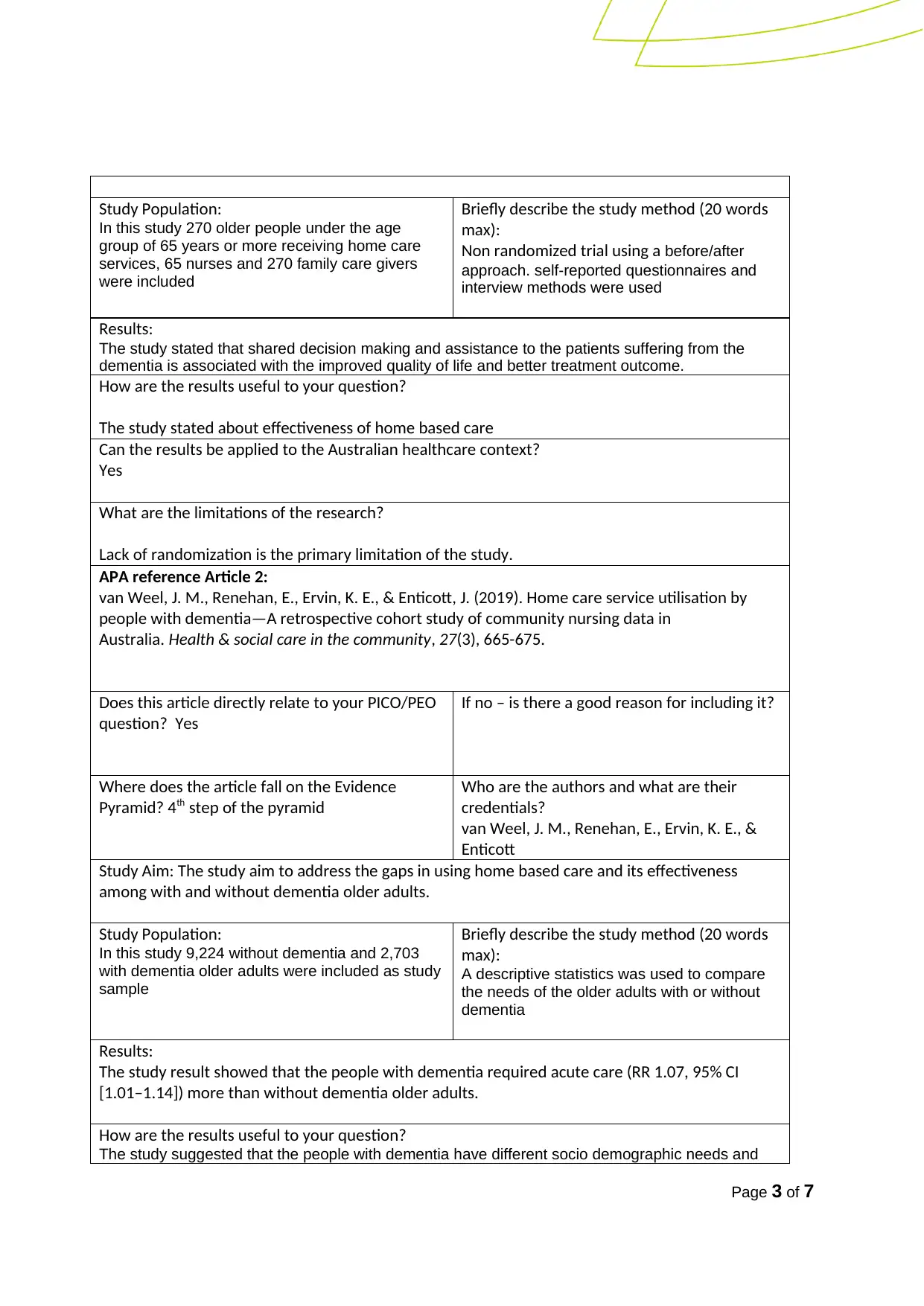
Study Population:
In this study 270 older people under the age
group of 65 years or more receiving home care
services, 65 nurses and 270 family care givers
were included
Briefly describe the study method (20 words
max):
Non randomized trial using a before/after
approach. self-reported questionnaires and
interview methods were used
Results:
The study stated that shared decision making and assistance to the patients suffering from the
dementia is associated with the improved quality of life and better treatment outcome.
How are the results useful to your question?
The study stated about effectiveness of home based care
Can the results be applied to the Australian healthcare context?
Yes
What are the limitations of the research?
Lack of randomization is the primary limitation of the study.
APA reference Article 2:
van Weel, J. M., Renehan, E., Ervin, K. E., & Enticott, J. (2019). Home care service utilisation by
people with dementia—A retrospective cohort study of community nursing data in
Australia. Health & social care in the community, 27(3), 665-675.
Does this article directly relate to your PICO/PEO
question? Yes
If no – is there a good reason for including it?
Where does the article fall on the Evidence
Pyramid? 4th step of the pyramid
Who are the authors and what are their
credentials?
van Weel, J. M., Renehan, E., Ervin, K. E., &
Enticott
Study Aim: The study aim to address the gaps in using home based care and its effectiveness
among with and without dementia older adults.
Study Population:
In this study 9,224 without dementia and 2,703
with dementia older adults were included as study
sample
Briefly describe the study method (20 words
max):
A descriptive statistics was used to compare
the needs of the older adults with or without
dementia
Results:
The study result showed that the people with dementia required acute care (RR 1.07, 95% CI
[1.01–1.14]) more than without dementia older adults.
How are the results useful to your question?
The study suggested that the people with dementia have different socio demographic needs and
Page 3 of 7
In this study 270 older people under the age
group of 65 years or more receiving home care
services, 65 nurses and 270 family care givers
were included
Briefly describe the study method (20 words
max):
Non randomized trial using a before/after
approach. self-reported questionnaires and
interview methods were used
Results:
The study stated that shared decision making and assistance to the patients suffering from the
dementia is associated with the improved quality of life and better treatment outcome.
How are the results useful to your question?
The study stated about effectiveness of home based care
Can the results be applied to the Australian healthcare context?
Yes
What are the limitations of the research?
Lack of randomization is the primary limitation of the study.
APA reference Article 2:
van Weel, J. M., Renehan, E., Ervin, K. E., & Enticott, J. (2019). Home care service utilisation by
people with dementia—A retrospective cohort study of community nursing data in
Australia. Health & social care in the community, 27(3), 665-675.
Does this article directly relate to your PICO/PEO
question? Yes
If no – is there a good reason for including it?
Where does the article fall on the Evidence
Pyramid? 4th step of the pyramid
Who are the authors and what are their
credentials?
van Weel, J. M., Renehan, E., Ervin, K. E., &
Enticott
Study Aim: The study aim to address the gaps in using home based care and its effectiveness
among with and without dementia older adults.
Study Population:
In this study 9,224 without dementia and 2,703
with dementia older adults were included as study
sample
Briefly describe the study method (20 words
max):
A descriptive statistics was used to compare
the needs of the older adults with or without
dementia
Results:
The study result showed that the people with dementia required acute care (RR 1.07, 95% CI
[1.01–1.14]) more than without dementia older adults.
How are the results useful to your question?
The study suggested that the people with dementia have different socio demographic needs and
Page 3 of 7
⊘ This is a preview!⊘
Do you want full access?
Subscribe today to unlock all pages.

Trusted by 1+ million students worldwide
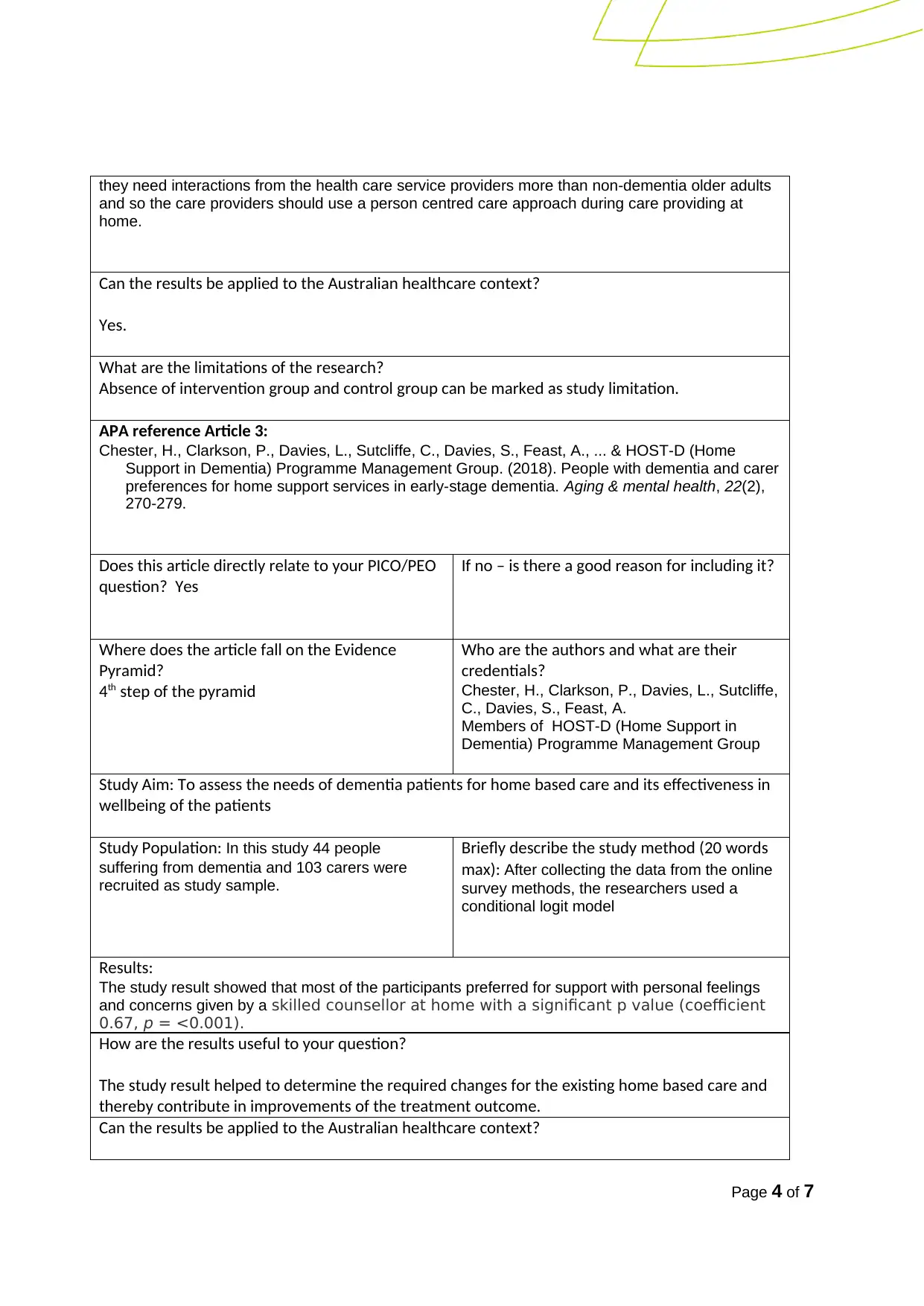
they need interactions from the health care service providers more than non-dementia older adults
and so the care providers should use a person centred care approach during care providing at
home.
Can the results be applied to the Australian healthcare context?
Yes.
What are the limitations of the research?
Absence of intervention group and control group can be marked as study limitation.
APA reference Article 3:
Chester, H., Clarkson, P., Davies, L., Sutcliffe, C., Davies, S., Feast, A., ... & HOST-D (Home
Support in Dementia) Programme Management Group. (2018). People with dementia and carer
preferences for home support services in early-stage dementia. Aging & mental health, 22(2),
270-279.
Does this article directly relate to your PICO/PEO
question? Yes
If no – is there a good reason for including it?
Where does the article fall on the Evidence
Pyramid?
4th step of the pyramid
Who are the authors and what are their
credentials?
Chester, H., Clarkson, P., Davies, L., Sutcliffe,
C., Davies, S., Feast, A.
Members of HOST-D (Home Support in
Dementia) Programme Management Group
Study Aim: To assess the needs of dementia patients for home based care and its effectiveness in
wellbeing of the patients
Study Population: In this study 44 people
suffering from dementia and 103 carers were
recruited as study sample.
Briefly describe the study method (20 words
max): After collecting the data from the online
survey methods, the researchers used a
conditional logit model
Results:
The study result showed that most of the participants preferred for support with personal feelings
and concerns given by a skilled counsellor at home with a significant p value (coefficient
0.67, p = <0.001).
How are the results useful to your question?
The study result helped to determine the required changes for the existing home based care and
thereby contribute in improvements of the treatment outcome.
Can the results be applied to the Australian healthcare context?
Page 4 of 7
and so the care providers should use a person centred care approach during care providing at
home.
Can the results be applied to the Australian healthcare context?
Yes.
What are the limitations of the research?
Absence of intervention group and control group can be marked as study limitation.
APA reference Article 3:
Chester, H., Clarkson, P., Davies, L., Sutcliffe, C., Davies, S., Feast, A., ... & HOST-D (Home
Support in Dementia) Programme Management Group. (2018). People with dementia and carer
preferences for home support services in early-stage dementia. Aging & mental health, 22(2),
270-279.
Does this article directly relate to your PICO/PEO
question? Yes
If no – is there a good reason for including it?
Where does the article fall on the Evidence
Pyramid?
4th step of the pyramid
Who are the authors and what are their
credentials?
Chester, H., Clarkson, P., Davies, L., Sutcliffe,
C., Davies, S., Feast, A.
Members of HOST-D (Home Support in
Dementia) Programme Management Group
Study Aim: To assess the needs of dementia patients for home based care and its effectiveness in
wellbeing of the patients
Study Population: In this study 44 people
suffering from dementia and 103 carers were
recruited as study sample.
Briefly describe the study method (20 words
max): After collecting the data from the online
survey methods, the researchers used a
conditional logit model
Results:
The study result showed that most of the participants preferred for support with personal feelings
and concerns given by a skilled counsellor at home with a significant p value (coefficient
0.67, p = <0.001).
How are the results useful to your question?
The study result helped to determine the required changes for the existing home based care and
thereby contribute in improvements of the treatment outcome.
Can the results be applied to the Australian healthcare context?
Page 4 of 7
Paraphrase This Document
Need a fresh take? Get an instant paraphrase of this document with our AI Paraphraser
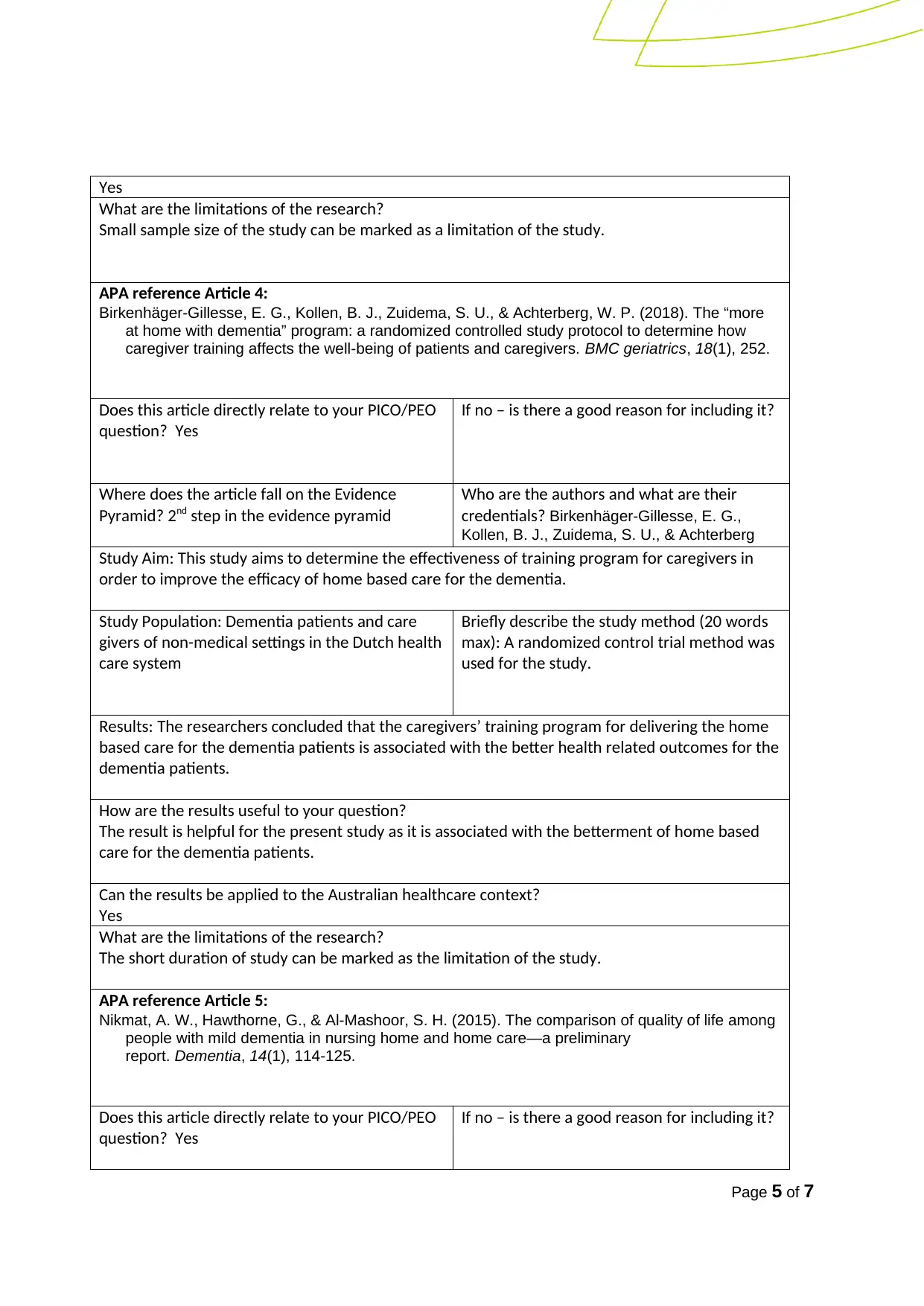
Yes
What are the limitations of the research?
Small sample size of the study can be marked as a limitation of the study.
APA reference Article 4:
Birkenhäger-Gillesse, E. G., Kollen, B. J., Zuidema, S. U., & Achterberg, W. P. (2018). The “more
at home with dementia” program: a randomized controlled study protocol to determine how
caregiver training affects the well-being of patients and caregivers. BMC geriatrics, 18(1), 252.
Does this article directly relate to your PICO/PEO
question? Yes
If no – is there a good reason for including it?
Where does the article fall on the Evidence
Pyramid? 2nd step in the evidence pyramid
Who are the authors and what are their
credentials? Birkenhäger-Gillesse, E. G.,
Kollen, B. J., Zuidema, S. U., & Achterberg
Study Aim: This study aims to determine the effectiveness of training program for caregivers in
order to improve the efficacy of home based care for the dementia.
Study Population: Dementia patients and care
givers of non-medical settings in the Dutch health
care system
Briefly describe the study method (20 words
max): A randomized control trial method was
used for the study.
Results: The researchers concluded that the caregivers’ training program for delivering the home
based care for the dementia patients is associated with the better health related outcomes for the
dementia patients.
How are the results useful to your question?
The result is helpful for the present study as it is associated with the betterment of home based
care for the dementia patients.
Can the results be applied to the Australian healthcare context?
Yes
What are the limitations of the research?
The short duration of study can be marked as the limitation of the study.
APA reference Article 5:
Nikmat, A. W., Hawthorne, G., & Al-Mashoor, S. H. (2015). The comparison of quality of life among
people with mild dementia in nursing home and home care—a preliminary
report. Dementia, 14(1), 114-125.
Does this article directly relate to your PICO/PEO
question? Yes
If no – is there a good reason for including it?
Page 5 of 7
What are the limitations of the research?
Small sample size of the study can be marked as a limitation of the study.
APA reference Article 4:
Birkenhäger-Gillesse, E. G., Kollen, B. J., Zuidema, S. U., & Achterberg, W. P. (2018). The “more
at home with dementia” program: a randomized controlled study protocol to determine how
caregiver training affects the well-being of patients and caregivers. BMC geriatrics, 18(1), 252.
Does this article directly relate to your PICO/PEO
question? Yes
If no – is there a good reason for including it?
Where does the article fall on the Evidence
Pyramid? 2nd step in the evidence pyramid
Who are the authors and what are their
credentials? Birkenhäger-Gillesse, E. G.,
Kollen, B. J., Zuidema, S. U., & Achterberg
Study Aim: This study aims to determine the effectiveness of training program for caregivers in
order to improve the efficacy of home based care for the dementia.
Study Population: Dementia patients and care
givers of non-medical settings in the Dutch health
care system
Briefly describe the study method (20 words
max): A randomized control trial method was
used for the study.
Results: The researchers concluded that the caregivers’ training program for delivering the home
based care for the dementia patients is associated with the better health related outcomes for the
dementia patients.
How are the results useful to your question?
The result is helpful for the present study as it is associated with the betterment of home based
care for the dementia patients.
Can the results be applied to the Australian healthcare context?
Yes
What are the limitations of the research?
The short duration of study can be marked as the limitation of the study.
APA reference Article 5:
Nikmat, A. W., Hawthorne, G., & Al-Mashoor, S. H. (2015). The comparison of quality of life among
people with mild dementia in nursing home and home care—a preliminary
report. Dementia, 14(1), 114-125.
Does this article directly relate to your PICO/PEO
question? Yes
If no – is there a good reason for including it?
Page 5 of 7
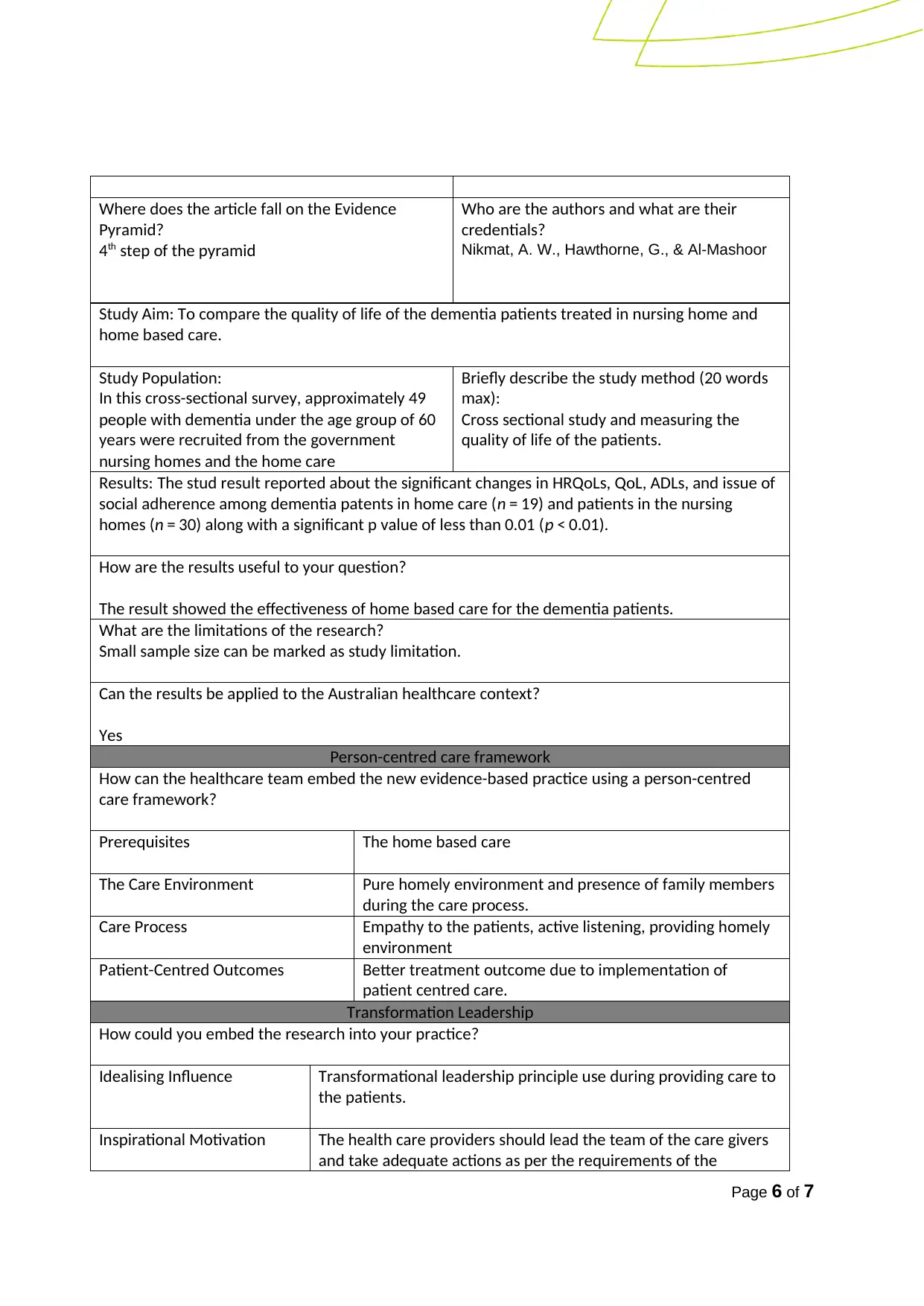
Where does the article fall on the Evidence
Pyramid?
4th step of the pyramid
Who are the authors and what are their
credentials?
Nikmat, A. W., Hawthorne, G., & Al-Mashoor
Study Aim: To compare the quality of life of the dementia patients treated in nursing home and
home based care.
Study Population:
In this cross-sectional survey, approximately 49
people with dementia under the age group of 60
years were recruited from the government
nursing homes and the home care
Briefly describe the study method (20 words
max):
Cross sectional study and measuring the
quality of life of the patients.
Results: The stud result reported about the significant changes in HRQoLs, QoL, ADLs, and issue of
social adherence among dementia patents in home care (n = 19) and patients in the nursing
homes (n = 30) along with a significant p value of less than 0.01 (p < 0.01).
How are the results useful to your question?
The result showed the effectiveness of home based care for the dementia patients.
What are the limitations of the research?
Small sample size can be marked as study limitation.
Can the results be applied to the Australian healthcare context?
Yes
Person-centred care framework
How can the healthcare team embed the new evidence-based practice using a person-centred
care framework?
Prerequisites The home based care
The Care Environment Pure homely environment and presence of family members
during the care process.
Care Process Empathy to the patients, active listening, providing homely
environment
Patient-Centred Outcomes Better treatment outcome due to implementation of
patient centred care.
Transformation Leadership
How could you embed the research into your practice?
Idealising Influence Transformational leadership principle use during providing care to
the patients.
Inspirational Motivation The health care providers should lead the team of the care givers
and take adequate actions as per the requirements of the
Page 6 of 7
Pyramid?
4th step of the pyramid
Who are the authors and what are their
credentials?
Nikmat, A. W., Hawthorne, G., & Al-Mashoor
Study Aim: To compare the quality of life of the dementia patients treated in nursing home and
home based care.
Study Population:
In this cross-sectional survey, approximately 49
people with dementia under the age group of 60
years were recruited from the government
nursing homes and the home care
Briefly describe the study method (20 words
max):
Cross sectional study and measuring the
quality of life of the patients.
Results: The stud result reported about the significant changes in HRQoLs, QoL, ADLs, and issue of
social adherence among dementia patents in home care (n = 19) and patients in the nursing
homes (n = 30) along with a significant p value of less than 0.01 (p < 0.01).
How are the results useful to your question?
The result showed the effectiveness of home based care for the dementia patients.
What are the limitations of the research?
Small sample size can be marked as study limitation.
Can the results be applied to the Australian healthcare context?
Yes
Person-centred care framework
How can the healthcare team embed the new evidence-based practice using a person-centred
care framework?
Prerequisites The home based care
The Care Environment Pure homely environment and presence of family members
during the care process.
Care Process Empathy to the patients, active listening, providing homely
environment
Patient-Centred Outcomes Better treatment outcome due to implementation of
patient centred care.
Transformation Leadership
How could you embed the research into your practice?
Idealising Influence Transformational leadership principle use during providing care to
the patients.
Inspirational Motivation The health care providers should lead the team of the care givers
and take adequate actions as per the requirements of the
Page 6 of 7
⊘ This is a preview!⊘
Do you want full access?
Subscribe today to unlock all pages.

Trusted by 1+ million students worldwide
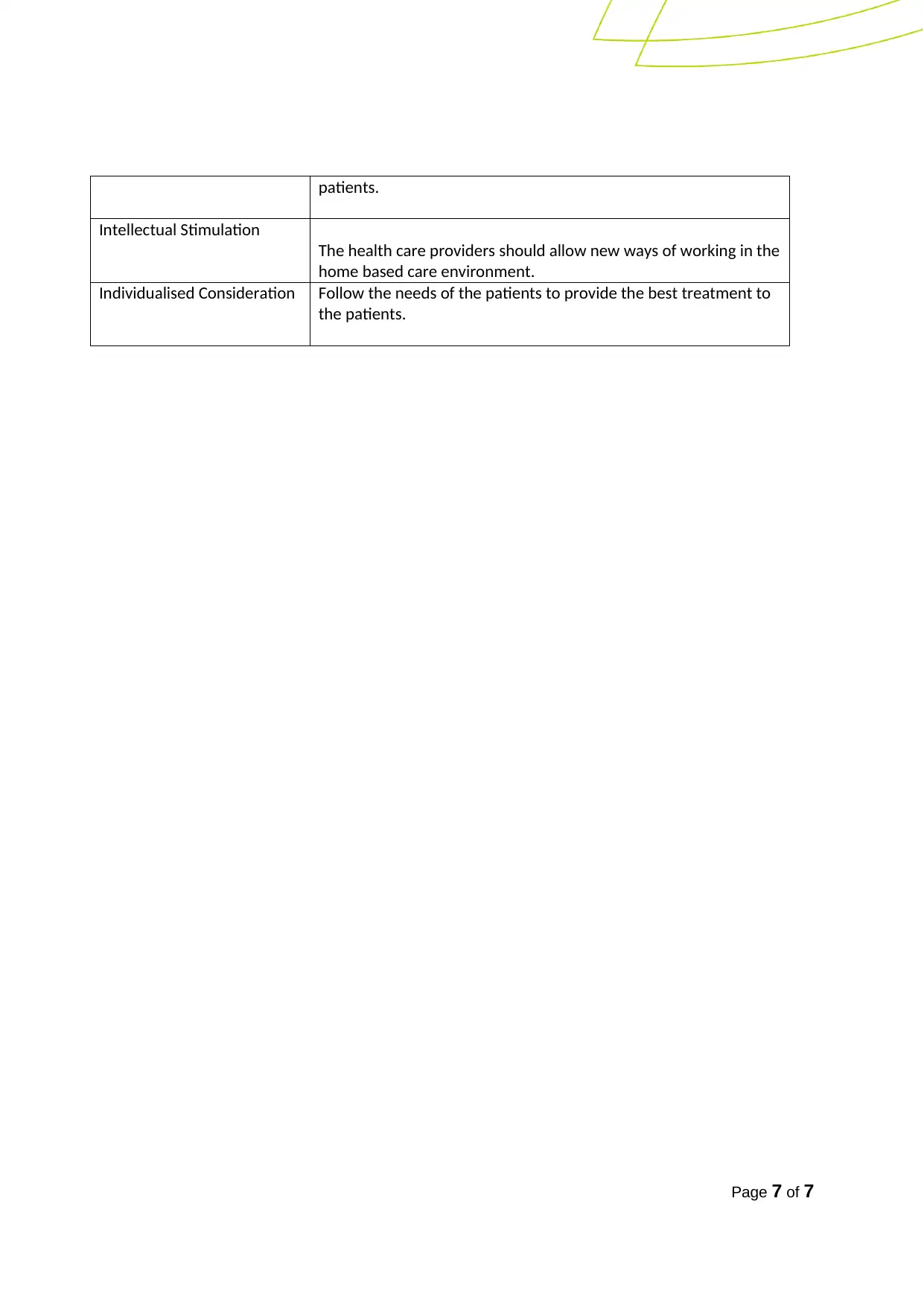
patients.
Intellectual Stimulation
The health care providers should allow new ways of working in the
home based care environment.
Individualised Consideration Follow the needs of the patients to provide the best treatment to
the patients.
Page 7 of 7
Intellectual Stimulation
The health care providers should allow new ways of working in the
home based care environment.
Individualised Consideration Follow the needs of the patients to provide the best treatment to
the patients.
Page 7 of 7
1 out of 7
Related Documents
Your All-in-One AI-Powered Toolkit for Academic Success.
+13062052269
info@desklib.com
Available 24*7 on WhatsApp / Email
![[object Object]](/_next/static/media/star-bottom.7253800d.svg)
Unlock your academic potential
Copyright © 2020–2026 A2Z Services. All Rights Reserved. Developed and managed by ZUCOL.





